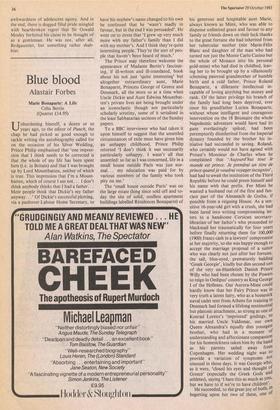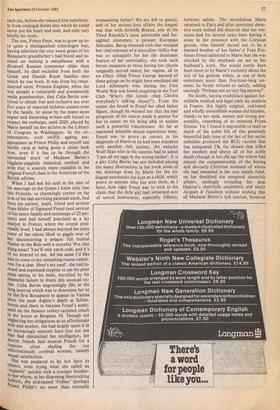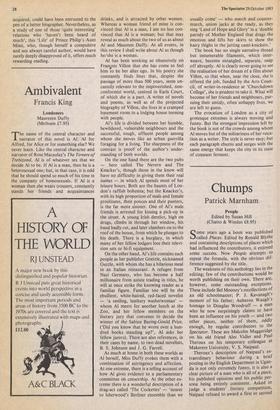Blue blood
Alastair Forbes
Marie Bonaparte: A Life Celia Bertin (Quartet £14.95)
Unburdening himself, a dozen or so Li years ago, to the editor of Punch, the chap he had picked as good enough to tackle writing the autobiography called for on the occasion of his Silver Wedding, Prince Philip emphasised that 'one impres- sion that I think needs to be corrected is that the whole of my life has been spent here (i.e. in Britain) and that I was brought up by Lord Mountbatten, neither of which is true. This impression that I'm a Mount- batten, which of course I am not I don't think anybody thinks that I had a father... Most people think that Dickie's my father anyway... ' Of Dickie's successful plotting, via a pushover Labour Home Secretary, to have his nephew's name changed to his own he confessed that he 'wasn't madly in favour, but in the end I was persuaded'. He went on to stress that 'I grew up very much more with my father's family than I did with my mother's. And I think they're quite interesting people. They're the sort of peo- ple that haven't been heard of much.'
The Prince may therefore welcome the appearance of Madame Bertin's fascinat- ing, if ill-written and ill-translated, book about his not just `quite interesting' but altogether extraordinary aunt, Marie Bonaparte, Princess George of Greece and Denmark, all the more so at a time when Uncle Dickie and Aunt Edwina Mountbat- ten's private lives are being brought under an iconoclastic though not particularly scholarly scrutiny, some of it serialised in the least Sabbatarian sections of the Sunday papers.
To a BBC interviewer who had taken it upon himself to suggest that the unsettled circumstances of exile must have given him an unhappy childhood, Prince Philip retorted 'I don't think it was necessarily particularly unhappy. I wasn't all that unsettled: so far as I was concerned, life in a small house outside Paris was just nor- mal... my education was paid for by various members of the family who took pity on me.'
The 'small house outside Paris' was on the large estate (long since sold off and to- day the site of solid, soulless apartment buildings labelled Residences Bonaparte) of
his generous and hospitable aunt Marie, always known as Mimi, who was able to dispense unlimited grace and favour to any family or friends down on their luck thanks to the great fortune she had inherited from her tubercular mother (nee Marie-Felix Blanc and daughter of the man who had turned not just the Monte Carlo Casino but the whole of Monaco into his personal gold-mine) who had died in childbed, leav- ing her to be brought up by a villainously scheming paternal grandmother of humble birth and a cold father, Prince Roland Bonaparte, a dilletante intellectual in- capable of loving anything but money and rank. Of the latter privilege his branch of the family had long been deprived, ever since his grandfather Lucien Bonaparte, without whose intelligent and courageous intervention on the 18 Brumaire the whole Napoleonic adventure would have had its guns everlastingly spiked, had been peremptorily disinherited from the Imperial dynasty founded by the brother his in- itiative had succeeded in saving. Roland, who certainly would not have agreed with Proust's Monsieur de Charlus when he complained that 'A ujourd'hui tout le monde est prince. Je prendrai un titre de prince quand je voudrai voyager incognito', had had to await the institution of the Third Republic before he could preen himself and his name with that prefix. For Mimi he wanted a husband out of the first and fan- ciest part of the Almanach de Gotha, if possible from a reigning House. As a sen- sitive 16-year-old girl with a crush, she had been lured into writing compromising let- ters to a handsome Corsican secretary- librarian of her father's who proceeded to blackmail her traumatically for four years before finally returning them for 100,000 (1900) francs cash in a lawyers' compromise at her majority, so she was happy enough to accept the marriage proposal of a suitor who was clearly not just after her fortune, the tall, blue-eyed, prematurely balding 'Greek Georgie', kindly but dim second son of the very un-Hamletish Danish Prince Willy who had been chosen by the Powers to reign in Oedipus' country as King George I of the Hellenes. Our Aurora-Mimi could hardly know that her Fairy Prince was in very truth a latent fairy, who as a homesick naval cadet sent from Athens for training10 Denmark had formed a lifelong sentimental but platonic attachment, as strong as one of Konrad Lorenz's 'imprinted' goslings, to his married Uncle Valdemar, our own Queen Alexandra's equally dim youngest brother, who had in a moment of understanding and affectionate compassion for his homesickness taken him by the hand as his parents sailed away from Copenhagen. Her wedding night was to provide a variation of symptoms not unusual in those days. It was Georgie who, as it were, 'closed his eyes and thought of Greece' (especially the Greek Gods and athletes), saying 'I hate this as much as you, but we have to if we're to have children
He succeeded, to the great joy of both, In begetting upon her two of these, one 01. each sex, before she released him indefinite- ly from conjugal duties into which he could never put his heart and soul, and only very briefly his body.
The son, Prince Peter, was to grow up in- to quite a distinguished ethnologist but, having inherited the very worst genes of his Bonaparte grandfather's bad blood and in- sisted on making a mesalliance with a divorced Russian commoner older than himself, he died excluded from both the Greek and Danish Royal families into which he was born. It was from his twice- Married sister, Princess Eugenie, when she was already a vulnerable and prematurely senile grandmother, that Celia Benin con- trived to obtain free and exclusive use over five years of material hitherto unseen even by the family, let alone by the many more expert and discerning writers still forced to respect the embargo, until 2020, placed by Marie herself on her archive in the Library of Congress in Washington. In the cir- cumstances, such swiftly ageing sex- agenarians as Prince Philip and myself can hardly carp at being given a closer look now, even if it has to be through the unweeded murk of Madame Bertin's higgledy-piggledy historical method and Style that is scarcely more readable in the original French than in the American of the British edition.
When I had met his aunt at the time of his marriage to the Queen I knew only that this Princess, so charmingly correct on the arm of his last surviving paternal uncle, had been the patient, pupil, friend and saviour from Hitler of Sigmund Freud (and saviour of his entire family and entourage of 22 per- sons) and had herself practised as a lay analyst in France, where the couple prin- cipally lived. I had always enjoyed the story some of her nieces liked to giggle over of her disconcerting a priapic full frontal flasher in the Bois with a scornful 'Put that thing away! You'll only catch cold, and it's of no interest to me. All the same I'd like You to come to my consulting rooms tomor- row for a chat. Here's my card', she had in- sisted and expressed surprise to see the poor chap taking to his heels, horrified by his Shameful failure to shock this unusual vic- tim. Celia Bertin engrossingly fills in the long interval which was to determine her to be the first Bonaparte to appear in Vienna since the poor Aiglon's death at SchOn- brunn and there to become Freud's analy- !and on the famous turkey-carpeted couch in the house at Bergasse 19. Though not neglecting her obligations as an affectionate Wife and mother, she had largely spent it in an increasingly neurotic hunt (but not one that had diminished her intelligence, her doctor friends had assured Freud) for a treasure often eluding the too selfconsciously cerebral woman, namely sexual satisfaction. She was prepared to let lust have its Chance, even trying what she called an orgiastic' quickie with a younger brother- irri-law whom, in her disarming bluestocking pas.hion, she nicknamed 'Pelleas' (perhaps rinee Philip's no more than normally
womanising father? We are left to guess), and of her serious love affairs the longest was that with Aristide Briand, one of the Third Republic's most admirable and far- sighted statesmen, a pioneer European federalist. Being obsessed with that vestigial but vital remnant of a masculine virility that was so unhappily for her the dominant feature of her personality, she took such heroic measures as twice having her clitoris surgically moved nearer her vagina, all to no effect. (Had Prince George learned of these goings-on he might have emulated old Lord Albemarle who during the First World War was heard enquiring in the Turf Club 'Who's this Greek chap Clitoris everybody's talking about?'). From the outset she found in Freud her ideal father figure, though he warned her that the bad prognosis of his cancer made it unwise for her to count on his being able to sustain such a powerful transference. As far as repressed infantile sexual experience went, Freud was to prove as correct in his diagnosis of Marie as he had been mistaken with another rich patient, the unlucky Wolf-Man who in his nineties had to admit 'I put all my eggs in the wrong basket'. It is a pity Celia Bertin has not included among the many illustrations in her book some of the drawings done by Marie for the tri- lingual notebooks she kept as a child, which prove to anyone who has seen them, as I have, how right Freud was to stick to his claim that the little girl had witnessed acts of sexual intercourse, especially fellatio, between adults. The incredulous Marie returned to Paris and after persistent detec- tive work indeed did discover that her wet- nurse had for several years been having it away in her presence with the Cdrsican groom, who himself turned out to be a bastard brother of her father's! Frau Pro- fessor Freud admitted to Marie that she was shocked by the emphasis on sex in her husband's work. She would surely have been more so by Marie's curiosity about the size of his genitals which, in one of their sometimes more than five-hour-long ses- sions, he firmly refused to satisfy, adding teasingly 'Perhaps not so very big anyway!".
No doubt, having established against for- midable medical and legal odds lay analysis in France, this highly original, cultivated and wholly unsnobbish woman did become, thanks to her rank, money and strong per- sonality, something of its resented Prima Donna. Yet I found it impossible to read so much of the noble life of this genuinely bountiful lady (one of the last of her secret subsidies produced the BCG vaccine that has conquered TB, the disease that killed her mother) and above all of her noble death (though in her old age the widow had missed the companionship of the boring and devoutly Christian husband of whom she had remained in her way deeply kind, on her deathbed she remained staunchly atheist, smilingly rereading her dear Diderot's cheerfully pessimistic and saucy Jacques le Fataliste) without wishing that all Madame Bertin's rich sources, however
acquired, could have been entrusted to the pen of a better biographer. Nevertheless, as a study of one of those 'quite interesting' relations who 'haven't been heard of much', this 'Life' of Prince Philip's Aunt Mimi, who, though herself a compulsive and not always careful author, would have surely deeply disapproved of it, offers much rewarding reading.
















































 Previous page
Previous page